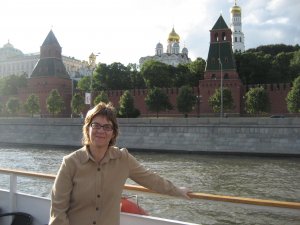Presented By: Center for Russian, East European, and Eurasian Studies
CREES Noon Lecture
Ethnic Intermarriage and the "Soviet People" in Central Asia

Adrienne Edgar, associate professor of history, University of California, Santa Barbara
This talk investigates identities in the Soviet Union through the lens of interethnic intimacy. Soviet authorities consistently celebrated mixed marriages as proof of the unbreakable "friendship of nations" and as a sign of the imminent emergence of a Soviet people. In "backward" regions such as predominantly Muslim Central Asia, the communist regime saw intermarriage as a way to promote modernity and a common Soviet way of life. Nevertheless, members of mixed families found it difficult to reconcile their multiple identities with being simply "Soviet." Using archival and published materials as well as oral history testimony from three post-Soviet states, Prof. Edgar examines both the official Soviet approach to ethnic mixing and the subjective experiences of mixed individuals and families.
Adrienne Edgar is an associate professor of Russian and Central Asian history at U.C. Santa Barbara. She received her BA in Russian from Oberlin College and MA in International Affairs from Columbia University. Edgar worked as a newspaper reporter and as editor of an international affairs journal for about ten years before returning to graduate school to obtain her doctorate in Russian history (Berkeley, 1999). She has held postdoctoral and visiting scholar appointments at Harvard, McGill, and the Humboldt University in Berlin. Edgar’s book, Tribal Nation: The Making of Soviet Turkmenistan, was published by Princeton University in 2004. She has also published numerous articles on ethnicity and gender in Soviet Central Asia, and is currently completing a book about ethnic intermarriage in the Soviet Union.
This talk investigates identities in the Soviet Union through the lens of interethnic intimacy. Soviet authorities consistently celebrated mixed marriages as proof of the unbreakable "friendship of nations" and as a sign of the imminent emergence of a Soviet people. In "backward" regions such as predominantly Muslim Central Asia, the communist regime saw intermarriage as a way to promote modernity and a common Soviet way of life. Nevertheless, members of mixed families found it difficult to reconcile their multiple identities with being simply "Soviet." Using archival and published materials as well as oral history testimony from three post-Soviet states, Prof. Edgar examines both the official Soviet approach to ethnic mixing and the subjective experiences of mixed individuals and families.
Adrienne Edgar is an associate professor of Russian and Central Asian history at U.C. Santa Barbara. She received her BA in Russian from Oberlin College and MA in International Affairs from Columbia University. Edgar worked as a newspaper reporter and as editor of an international affairs journal for about ten years before returning to graduate school to obtain her doctorate in Russian history (Berkeley, 1999). She has held postdoctoral and visiting scholar appointments at Harvard, McGill, and the Humboldt University in Berlin. Edgar’s book, Tribal Nation: The Making of Soviet Turkmenistan, was published by Princeton University in 2004. She has also published numerous articles on ethnicity and gender in Soviet Central Asia, and is currently completing a book about ethnic intermarriage in the Soviet Union.